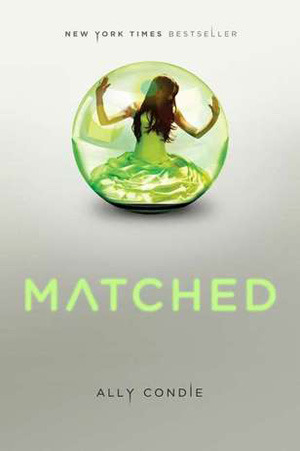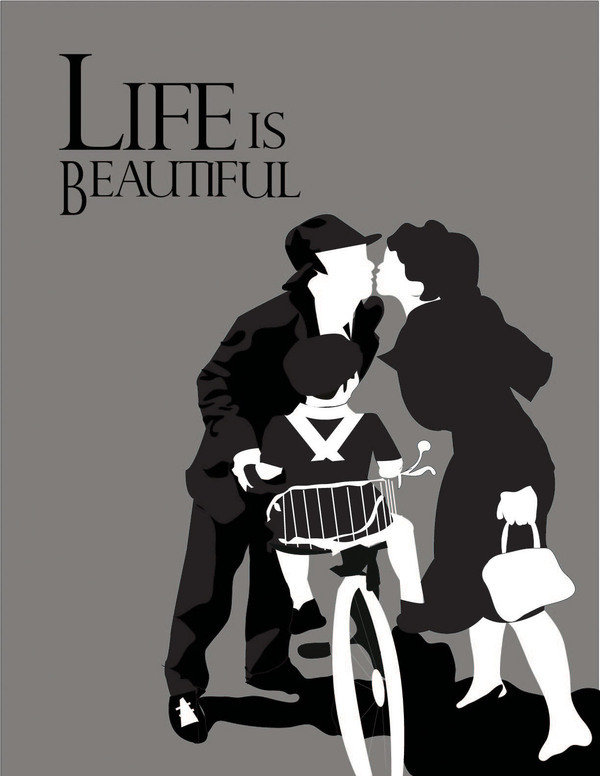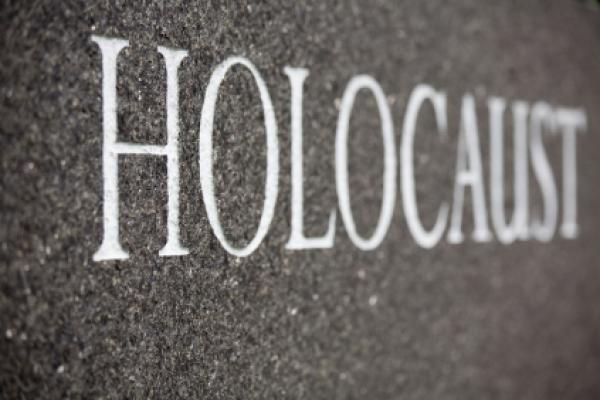Based on the Holocaust readings we've done, there have been connections and distinctions between both the movie Life Is Beautiful and the book Night by Elie Wiesel. The movie Life Is Beautiful shows life before the Holocaust and even during (living in) the concentration camps in more of a positive note. As for the book Night shows the more real and negative side to the story. They were both about the same topics though; and that was life during the Holocaust.
There were more differences in the movie and the book than similarities. Similarly though, they both included a part when the hard labor was described/shown. In the book, Elie had to do such hard work with the others that his foot had become swollen due to continuous hours of work and the extreme weather they had to be in with only a shirt and pants. On page 74, the book reads, "...my right foot began swell because of the cold. I was unable to put it on the ground." This was similar to the hard labor in the movie, but it was shown on a lighter note.
In the film, Guido, the main character; had to go to work everyday with everyone else. Everyone had to do forced labor and carry very heavy things. He covered the fact that he was forced to do work for his son. He told him that their whole time in the camp was a game that they were playing for points to win a tank.
One other similarity that the movie and book had in common was that there was a father and son as the main characters (aside from Guido's wife Dora in the film). In Night, Elie and his father were both aware of how they were in the concentration camp since Elie was a teen at the time. In Life is Beautiful, Guido's son Giosue was very young, so he didn't know about most of the actual events that were going on as he was in the camp. Then, another thing that both the movie and book had in common was how they both involved being secretive.
Being secretive helped both Elie and his father, and Guido and his son survive. In the book, Elie helped his father live when the SS were sorting and selecting the weak and those who could walk well. Elie and his father got sent to opposite sides, so he ran after his father and the SS went to bring Elie back. On page 91 of the book, it said; "Several SS rushed to bring me back, creating such confusion that many of the people form the left were able to come back to the right-and among them, my father and myself." This was just one of the times that Elie helped his father or vice versa.
In the movie, Guido helped his son to survive by telling him to hide in small cabinet outside. This helped Giosue survive because he listed to his father's advice to stay quiet and not come out until everything was quiet. The movie foreshadowed this scene a bit in the beginning because since Giosue didn't want to take a bath, he hid in a small cabinet at home, like the one in the concentration camp. Also, he could've been sent to the gas chamber when everyone we told that they were going to take 'showers'; but he decided to stay back and hide which saved his own life.
Both the movie and the book have a lot of differences, one is that the book was focused mostly on Elie and his father. In the movie, it was focused on Guido and his wife Dora mostly in the beginning, until later in the movie it focused on their entire family including Giosue. Also, a huge difference of the both is that the moods/tones are completely different; even though they were both set during the Holocaust, one was more negative while the other was more positive. Night was a very gloomy and depressing book that showed the real hardships that Elie and everyone in the concentration camps during the Holocaust endured.
In Life Is Beautiful, the beginning was cheerful, and even the middle and the end were not that somber for the most part. What helped the movie be more positive was that it had a lot of humor in in such as when Guido thought or pretended that he had powers to do things in his mind (liked when he wanted to detain the guard dogs from barking at the cabinet where Giosue was hiding). They overall had completely different tones with the same topics.
As well as humor, the movie had a lot of suspense; one scene that had a lot of suspense was when Guido was trying to hide from a guard, but one found him and took him behind a building. The scene just shows the wall but there are gunshots heard. Some viewers can infer that Guido shot the guard and ran away with the gun since after that scene the rushed away, and there isn't a clear view of his (the guard's) face. Viewers can believe this because Guido could've switched clothes with the guard, and he had dressed up before to survive. Although, it didn't end up being Guido since he was the one who was shot.
Throughout the film, there are certain parts where it is shown that Life is Beautiful. In the middle of the movie, Guido's family are happy and live in good conditions. Then, they are taken to a concentration camp and have to try to survive there. This alone is supposed to show that their life before is something to be appreciated and how life is beautiful. Also, there are just certain instances where Giosue gets to escape when he's probably going to go into the gas chamber or get in trouble.
One scene (other than how he survived in the cabinets) was when he was sitting in the room having dinner with other kids, but no one was aloud to speak. Giosue accidentally thanked one of the servers when he gave him food. The server went to report what had happened when Guido decided that he could fix the situation. He made all the kids say "thank you" when the server came back with one of the SS women that were in charge. This made it seem that it was everyone, and not just Giosue so he wouldn't get in trouble.
 In my opinion, I think that the most difficult part of 3rd quarter for me was just to keep up with all of my schoolwork and turn it in on time. I tried to manage my time wisely in order to overcome this problem. I think that the area that I made the biggest improvement in English Language Arts was my writing. I feel that I improved in this because we have wrote a lot in class and it got better with practice as I went.
In my opinion, I think that the most difficult part of 3rd quarter for me was just to keep up with all of my schoolwork and turn it in on time. I tried to manage my time wisely in order to overcome this problem. I think that the area that I made the biggest improvement in English Language Arts was my writing. I feel that I improved in this because we have wrote a lot in class and it got better with practice as I went.



